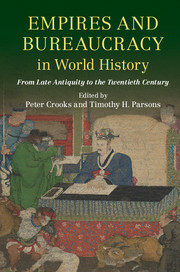Book contents
- Frontmatter
- Contents
- List of Figures
- List of Maps
- List of Tables
- List of Contributors
- Preface
- List of Abbreviations
- Part I Introduction
- Part II Empires and Bureaucracy in World-Historical Perspective
- Part III From Late Antiquity to the Middle Ages
- Part IV From the Age of European Expansion to the End of Empires
- 12 Magistrates to Administrators, Composite Monarchy to Fiscal-Military Empire: Empire and Bureaucracy in the Spanish Monarchy, c.1492–1825
- 13 Britain's Overseas Empire before 1780: Overwhelmingly Successful and Bureaucratically Challenged
- 14 ‘Les Enfants du Siècle’: An Empire of Young Professionals and the Creation of a Bureaucratic, Imperial Ethos in Napoleonic Europe
- 15 Bureaucracy, Power and Violence in Colonial India: The Role of Indian Subalterns
- 16 From Chief to Technocrat: Labour and Colonial Authority in Post–World War II Africa
- 17 The Unintended Consequences of Bureaucratic ‘Modernization’ in Post–World War II British Africa
- Part V Afterword
- Index
17 - The Unintended Consequences of Bureaucratic ‘Modernization’ in Post–World War II British Africa
from Part IV - From the Age of European Expansion to the End of Empires
Published online by Cambridge University Press: 05 August 2016
- Frontmatter
- Contents
- List of Figures
- List of Maps
- List of Tables
- List of Contributors
- Preface
- List of Abbreviations
- Part I Introduction
- Part II Empires and Bureaucracy in World-Historical Perspective
- Part III From Late Antiquity to the Middle Ages
- Part IV From the Age of European Expansion to the End of Empires
- 12 Magistrates to Administrators, Composite Monarchy to Fiscal-Military Empire: Empire and Bureaucracy in the Spanish Monarchy, c.1492–1825
- 13 Britain's Overseas Empire before 1780: Overwhelmingly Successful and Bureaucratically Challenged
- 14 ‘Les Enfants du Siècle’: An Empire of Young Professionals and the Creation of a Bureaucratic, Imperial Ethos in Napoleonic Europe
- 15 Bureaucracy, Power and Violence in Colonial India: The Role of Indian Subalterns
- 16 From Chief to Technocrat: Labour and Colonial Authority in Post–World War II Africa
- 17 The Unintended Consequences of Bureaucratic ‘Modernization’ in Post–World War II British Africa
- Part V Afterword
- Index
Summary
Look, young man, if you're going to understand colonial administration, there are two words you will instantly excise from your vocabulary. The first word is ‘bureaucracy’ and the second word is ‘theory’. Without them you'll get on much better.
—J. J. Tawney (Director, Oxford Colonial Records Project) to Bruce BermanJ. J. Tawney's seemingly dismissive statement about administration in British Africa, which he made to a young academic in 1975, was actually quite telling. In offering this blunt advice, Tawney – a former member of the colonial civil service – acknowledged that imperial systems of rule were fundamentally different from the bureaucratic institutions of Western nation states, and he made it clear that the men who ran British Africa did not see themselves as bureaucrats. Max Weber's ideal-type bureaucracy was depersonalized, rational and ordered precisely by regulation. Social scientists often list this kind of efficient bureaucracy as a central characteristic of ‘modernity’, but the administrative systems that the architects of the ‘new’ empires of the 1880s used to govern their African territories met few of Weber's criteria. Until World War II, the primary inspiration for British systems of imperial rule in Africa were the chartered companies of the early modern era, not the Western nation state. Most significantly, the post-war Labour government's attempt to revitalize Britain's African empire by making it more rational and efficient actually accelerated its unexpectedly rapid demise a decade later.
Empire, by strict definition, was the formal, permanent and authoritarian rule of one group of people over another. In hindsight, the great empires of the past appeared omnipotent and stable because they were long lived, but they actually lacked the capacity to govern directly at the local level. This meant that conquerors needed allies from subject populations to assert authority and extract revenue. They had to share power to exert power. Contrary to Weber, bureaucratic inefficiency was thus a virtue in that it made imperial rule more stable by forcing foreign rulers to temper their demands for tribute and labour.
The system of indirect rule, which British administrators developed in India, was an inexpensive pragmatic innovation that allowed a small handful of field officers to govern colonial majorities by enlisting some of them in their own subjugation.
- Type
- Chapter
- Information
- Empires and Bureaucracy in World HistoryFrom Late Antiquity to the Twentieth Century, pp. 412 - 434Publisher: Cambridge University PressPrint publication year: 2016
- 1
- Cited by

